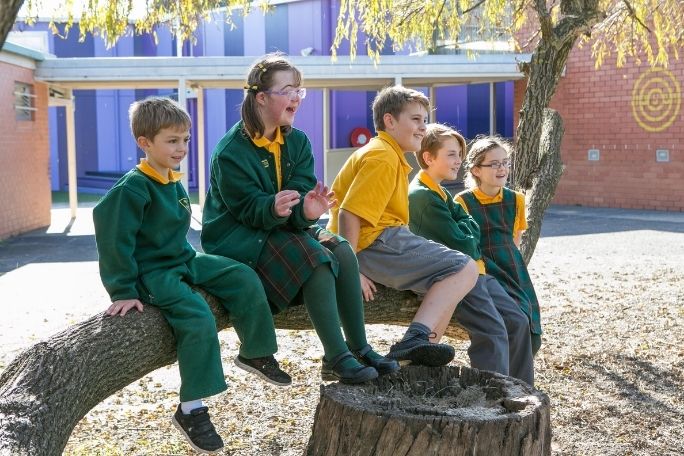Lesson summary
In this lesson, students will explore the concept of difference. They will begin by considering an image associated with the familiar phrase “if you judge a fish by its ability to climb a tree, it will live its whole life believing that it is stupid.” They will discuss the suitability of the task for the various animals in the image, and then progress to developing obstacle courses that consider the abilities of each animal. They will then relate this to us as people, completing an obstacle course themselves.
Learning intentions:
Students will...
- recognise that we are all different
Success criteria:
Students can...
- explain why particular tasks are more suited to some animals than others
- identify that there are differences between us as people
- explain that particular activities can be easier for some people than others
Lesson guides and printables
Lesson details
Skills
This lesson is designed to build students’ competencies in the following skills:
- Communication
- Creativity
- Critical thinking
- Empathy
- Problem solving
- Social skills
Curriculum mapping
Australian curriculum content descriptions:
Year 1 and 2 Health and Physical Education:
- Describe their own strengths and achievements and those of others, and identify how these contribute to personal identities (ACPPS015)
- Describe ways to include others to make them feel they belong (ACPPS019)
- Explore actions that help make the classroom a healthy, safe and active place (ACPPS022)
- Recognise similarities and differences in individuals and groups, and explore how these are celebrated and respected (ACPPS024)
- Perform fundamental movement skills in a variety of movement sequences and situations (ACPMP025)
- Create and participate in games with and without equipment (ACPMP027)
- Use strategies to work in group situations when participating in physical activities (ACPMP030)
- Identify rules and fair play when participating in physical activities (ACPMP032)
Year 1 and 2 Design and Technologies:
- Identify how people design and produce familiar products, services and environments and consider sustainability to meet personal and local community needs (ACTDEK001)
- Explore the characteristics and properties of materials and components that are used to produce designed solutions (ACTDEK004)
- Explore needs or opportunities for designing, and the technologies needed to realise designed solutions (ACTDEP005)
Year 1 English:
- Engage in conversations and discussions, using active listening behaviours, showing interest, and contributing ideas, information and questions (ACELY1656)
- Use interaction skills including turn-taking, recognising the contributions of others, speaking clearly and using appropriate volume and pace (ACELY1788)
Year 2 English:
- Listen for specific purposes and information, including instructions, and extend students’ own and others’ ideas in discussions (ACELY1666)
- Use interaction skills including initiating topics, making positive statements and voicing disagreement in an appropriate manner, speaking clearly and varying tone, volume and pace appropriately (ACELY1789)
Syllabus outcomes: GDS1.9, GSS1.8, GYS1.10, COS1.1, INS1.3, IRS1.11, SLS1.13, MOS1.4, STe-9ME, STe-10ME, ST1-14BE, ST1-15I, ST1-16P, ST1-12MW, ST1-13MW, EN1-1A.
General capabilities: Literacy, Personal and Social Capability, Ethical Understanding, Critical and Creative Thinking
Relevant parts of Year 1 and 2 Health and Physical Development Achievement Standards: By the end of Year 2 students recognise how strengths and achievements contribute to identities. Students demonstrate positive ways to interact with others. They select and apply strategies to keep themselves healthy and safe and are able to ask for help with tasks or problems. They demonstrate fundamental movement skills in a variety of movement sequences and situations and test alternatives to solve movement challenges. They perform movement sequences that incorporate the elements of movement
Relevant parts of Foundation – 2 Design and Technologies Achievement Standards: By the end of Year 2, students describe the purpose of familiar products, services and environments and how they meet a range of present needs. They list the features of technologies that influence design decisions and identify how digital systems are used. Students identify needs, opportunities or problems and describe them. Students record design ideas using techniques including labelled drawings, lists and sequenced instructions. They design solutions to simple problems using a sequence of steps and decisions. They safely create solutions and communicate ideas and information face-to-face and online.
Relevant parts of Year 1 English Achievement Standards: By the end of Year 1, students understand the different purposes of texts. They listen to others when taking part in conversations, using appropriate language features and interaction skills. They interact in pair, group and class discussions, taking turns when responding.
Relevant parts of Year 2 English Achievement Standards: By the end of Year 2, students understand how similar texts share characteristics by identifying text structures and language features used to describe characters and events, or to communicate factual information. They listen for particular purposes. When discussing their ideas and experiences, students use everyday language features and topic-specific vocabulary.
Level of teacher scaffolding: Medium – some students may require support to make decisions about what approach they will take to complete the independent task
Additional info
Time required: 90 mins
Level of teacher scaffolding: Medium – some students may require support to make decisions about what approach they will take to complete the independent task
These lessons have been developed in partnership with Down Syndrome Australia
Resources required
- Obstacle Course Guide
- Paper and pencils
- Sports equipment to create your chosen obstacle course design
- Stimulus image
- A variety of construction resources
- Celebrating Strengths Examples (optional)


Welcome back!
Don't have an account yet?
Log in with:
By signing up to Cool.org you consent and agree to Cool's privacy policy to
store, manage and process your personal information. To read more, please see
our privacy policy here(Opens in new tab).
Create your free Cool.org account.
Many of our resources are free, with an option to upgrade to Cool+ for premium content.
Already have an account?
Sign up with:
By signing up to Cool.org you consent and agree to Cool's privacy policy to
store, manage and process your personal information. To read more, please see
our privacy policy here(Opens in new tab).